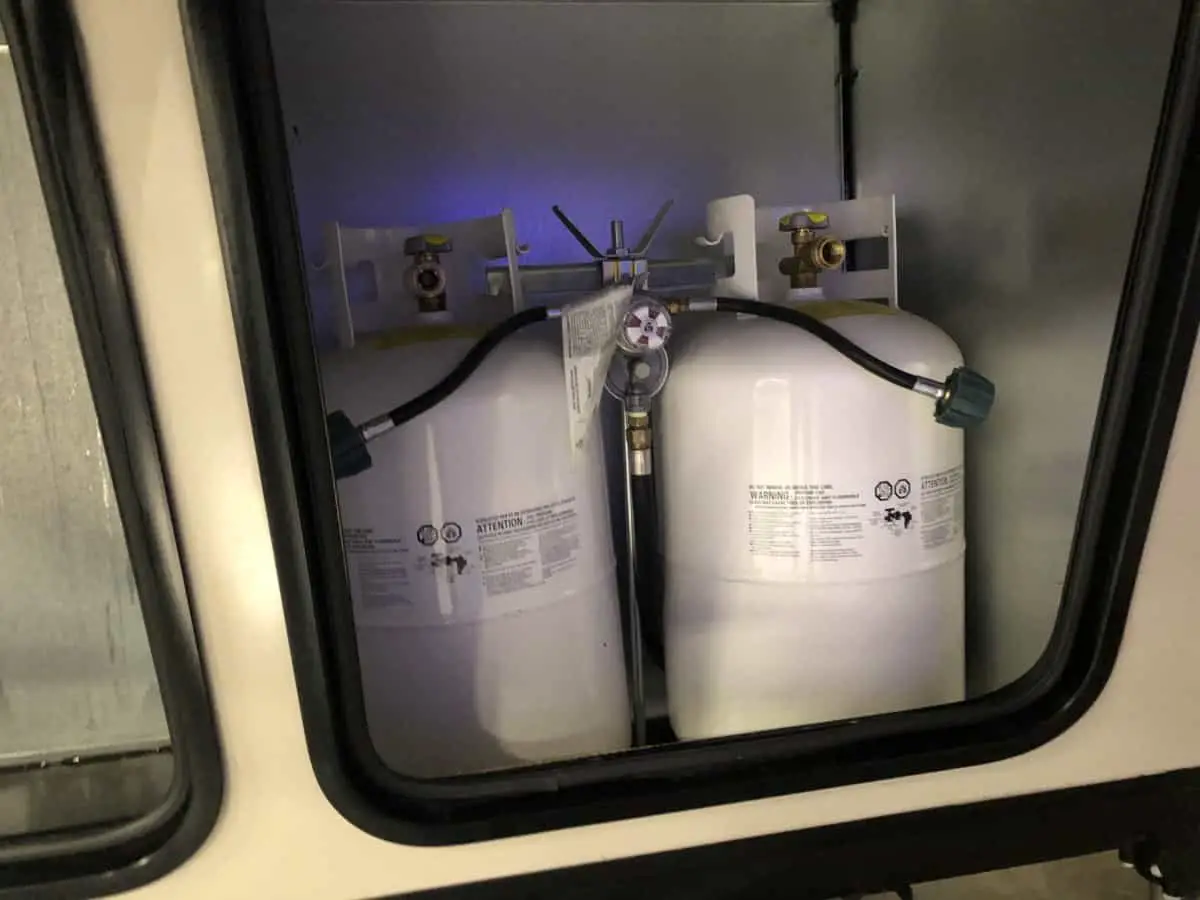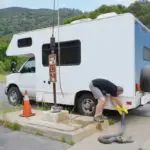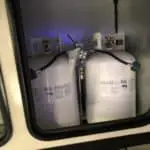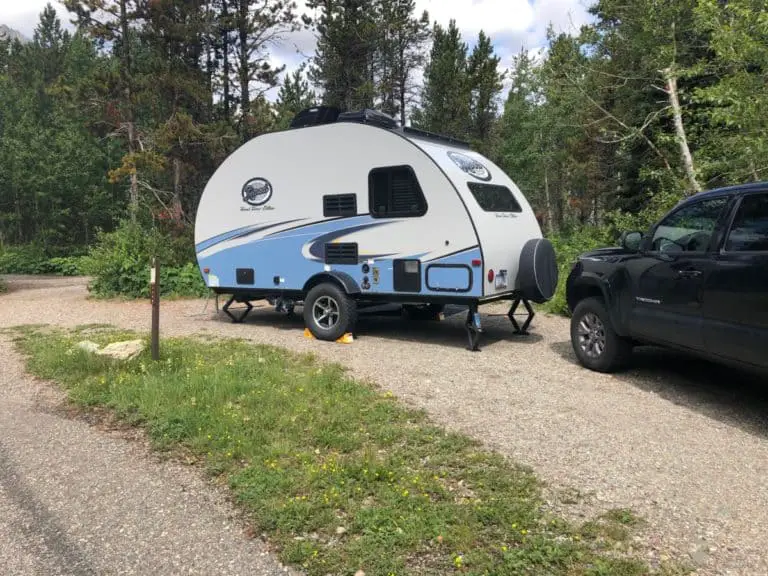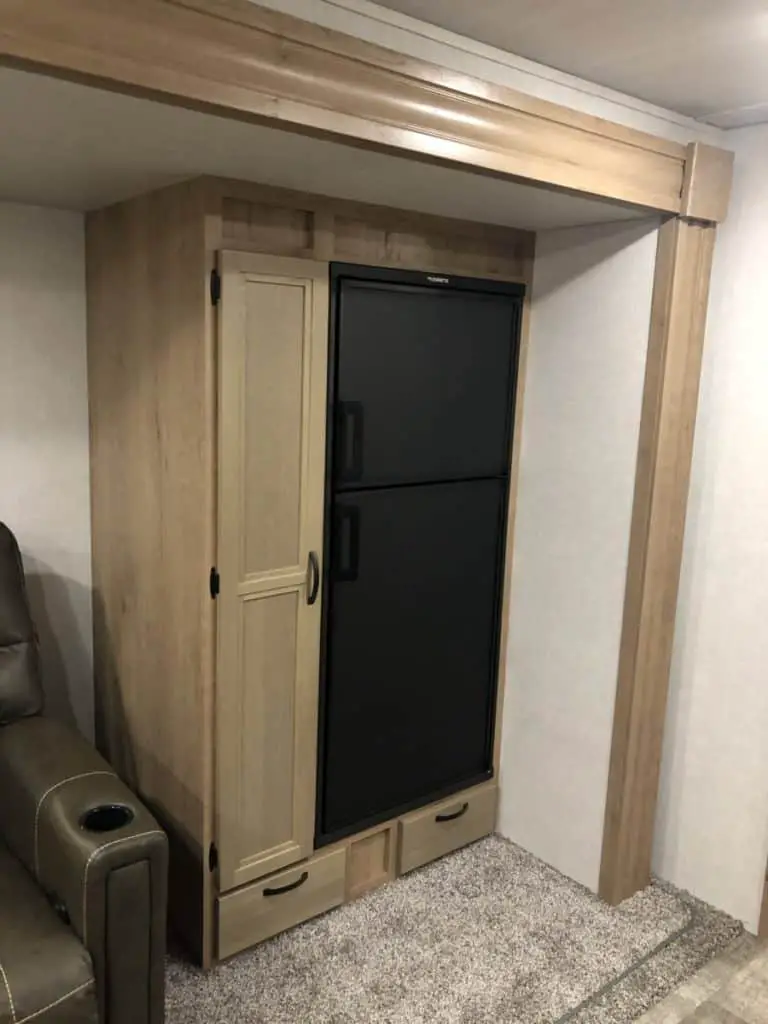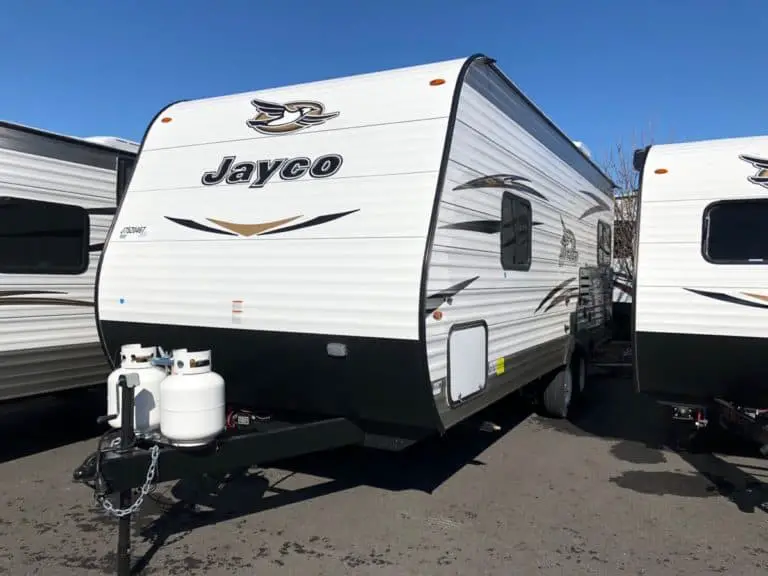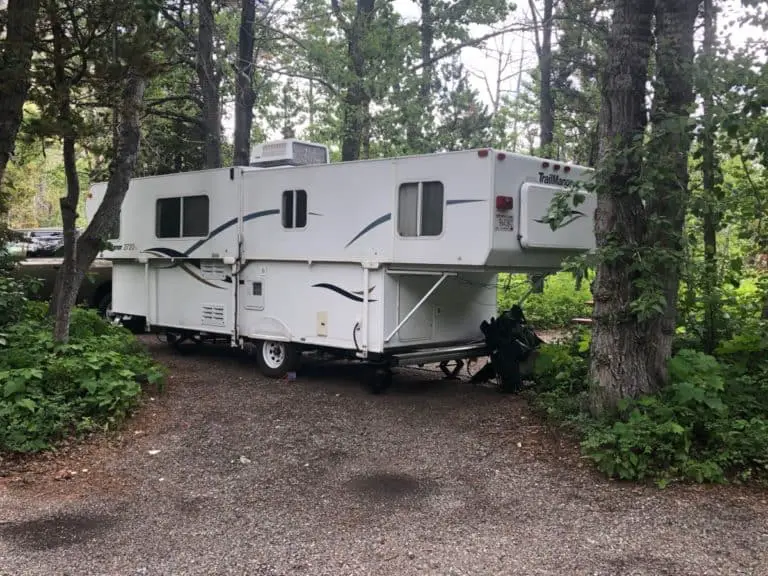How And Where To Get Your RV Propane Tank Recertified: A Quick Guide
RV enthusiasts know that safety is a top priority when it comes to their travels. One key component that plays a crucial role in the safety of an RV is the propane tank. Propane tanks have a shelf life, and over time, they can become less reliable and potentially hazardous. To ensure the safety and longevity of your RV adventures, it’s essential to have your propane tank recertified.
Propane tanks need to be recertified every 5-12 years based on the date of manufacture at many propane tank supply stores. Recertification includes visual and function inspections. A propane tank recertification sticker will have the license number of the inspector followed by the date the certification was done.
Recertification of an RV propane tank is a process that ensures the integrity, functionality, and safety of the tank. It involves a thorough inspection, conducted by a certified professional, to determine if the tank meets industry standards and can continue to be used safely. Additionally, this process helps in identifying any potential issues that may need to be addressed.
Knowing when and where to have your RV propane tank recertified can be a challenge for some RV owners, as the process is not always straightforward. In this article, we will explore how to determine if it’s time for your tank to be recertified, and where to find the appropriate facilities and professionals to handle this important task.
Why Propane Tank Recertification Is Necessary
Safety Concerns
Propane tanks are subjected to constant pressure and varying temperatures, which can cause wear and tear. Over time, these factors may lead to leaks or other potentially dangerous situations.
Recertification ensures that tanks are inspected and maintained regularly, reducing the risk of accidents and protecting your investment in your RV.
Proper inspections also help identify any issues early on. This enables timely repairs and replacement before the tank becomes a safety hazard. By following the recommended recertification schedule, you can significantly mitigate the risk associated with the use of propane tanks in your RV.
Legal Requirements
By law, propane tanks are required to undergo recertification before they can be used. The Department of Transportation (DOT) sets guidelines regarding the frequency of inspections and certifications, which vary based on factors like the type and size of the tank. Failing to recertify a propane tank can result in fines or other legal penalties.
For example, DOT cylinders (which are commonly used in RVs) must be recertified 12 years after their initial manufacture date and every five years thereafter. These regulations are in place to ensure that all RV owners comply with the safety standards set by the DOT.
Ensuring your RV propane tank is recertified not only keeps you in compliance with the law but also demonstrates your commitment to safety and encourages others to follow suit. By staying current with certification requirements, you can play your part in promoting responsible RV practices and reducing potential hazards for everyone on the road.
The Propane Tank Recertification Process
Visual Inspection
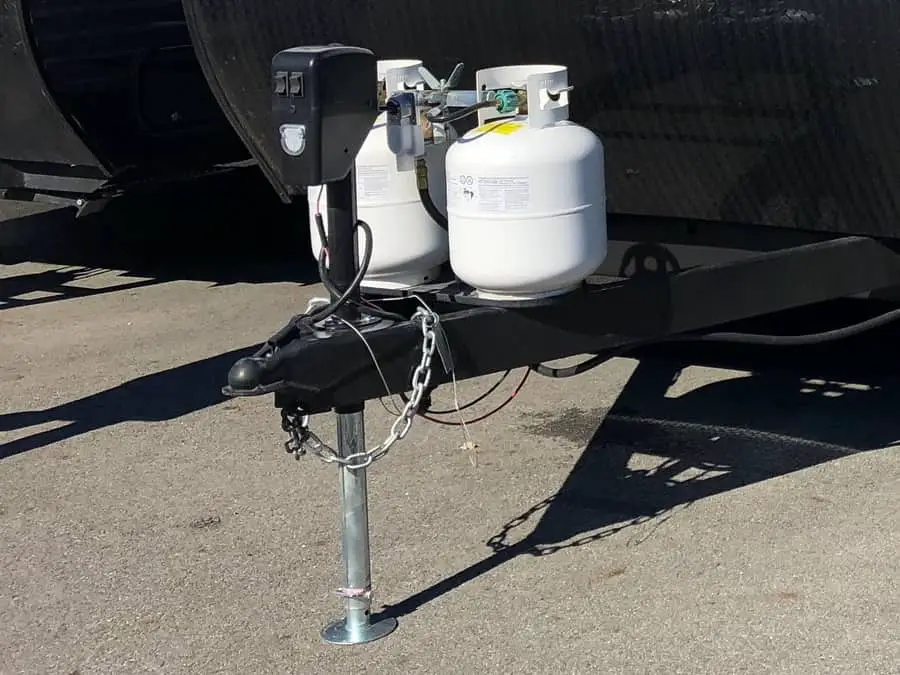
During the visual inspection, a certified technician will examine the RV propane tank for any signs of damage or wear. This includes checking for rust, dents, cracks, pitting, and fire damage. The technician will also review the tank’s markings, such as the requalification identification number (RIN), to ensure it meets the required standards.
If the visual inspection reveals any major issues that cannot be repaired, the tank might be deemed unsafe and must be replaced. Minor issues may be repaired onsite by the technician. Proper maintenance and regular checks can help to prevent such issues from arising.
Pressure Test
The pressure test, also known as the proof-pressure method, is a vital step in the propane tank recertification process. During this test, the certified technician will pressurize the tank to a specific level above its regular operating pressure. This helps in identifying any potential weaknesses or leaks in the tank’s structure.
Upon completion of the pressure test, the technician should be able to confirm if the tank is structurally sound and safe for continued use.
Volumetric Expansion Test
The volumetric expansion test is another crucial component in the recertification process. This test is designed to measure the tank’s ability to expand and contract under pressure fluctuations without losing its structural integrity.
A certified technician will perform this test by applying pressure to the tank and measuring its volume at different stages. The tank’s volume should fall within a specific range, otherwise, it may be deemed unsafe and require replacement.
Following the completion of the visual inspection, pressure test, and volumetric expansion test, the propane tank is either recertified or deemed unsafe. A recertified tank will be marked accordingly and can be safely used for an additional period of time before requiring another inspection. Make sure to consult with your certified technician about the recommended intervals for propane tank recertification for your specific tank.
When To Get Your RV Propane Tank Recertified
Date of Manufacture
The process of propane tank recertification begins by understanding when a tank was manufactured. The date of manufacture can be found on the tank itself, usually located near the valve. It is important to locate this date, as the tank’s age determines when recertification is required.
Propane tanks require recertification every 5 years, starting from the date of manufacture. Tanks that are one-time use, however, do not require recertification and should be disposed of after their contents are depleted.
Expiration Date
Besides the date of manufacture, it is crucial to know the expiration date of your propane tank. An expiration date is usually date stamped on the same area on the tank, near the valve.
A good rule of thumb is to recertify propane tanks before they turn 12 years old. This can be determined by checking the expiration date on the tank. Properly maintained tanks can be recertified a number of times before they are no longer usable.
In contrast, ASME propane tanks, which are typically found on larger RVs, do not have an expiration date. Instead, they require inspections by qualified inspectors, and professional maintenance. In the case of ASME propane tanks, it is wise to consult the tank manufacturer or owner’s manual for guidelines on maintenance and inspection intervals.
Signs Your Propane Tank Needs Recertification
Leaks
Leaks in your propane tank can be a sign that it needs recertification. If you notice the smell of propane or hear a hissing sound, it could indicate a leak. Regularly inspect the valve cover, pressure release, and welds on the tank for potential leaks. It’s important to address any leaks promptly, as they pose a dangerous situation.
Damage and Rust
Damage to your propane tank, such as dents or cracks, may also necessitate recertification. Look for any signs of damage on the tank’s collar or body. Rust can cause structural weakness in propane tanks and is another sign that recertification may be required.
- If there’s visible rust or pitting, it may be time for a recertification.
- Welds and seams should be free from rust and other forms of damage.
- New propane tanks should be free of dents and damage.
Expired Sticker
The propane tank recertification sticker is an essential element in determining whether your tank needs recertification. This sticker typically displays an expiration date, which indicates when it’s time to get your tank re-certified. If your propane tank has an expired sticker or the sticker is missing, it’s essential to get it recertified for safe usage.
Where To Get Your RV Propane Tank Recertified
Propane Retailers
One of the best places to consider for recertifying your RV propane tank are propane retailers. These businesses specialize in supplying and servicing propane tanks, and they are typically knowledgeable about the recertification process. Many local propane dealers offer tank recertification services, making it convenient for RV owners to get their tanks inspected and recertified.
AmeriGas is the easiest company to aim for. A quick Google search should show your nearest AmeriGas, as they are all over the country.
Google should organize the top results of all the nearest AmeriGas locations. All you now need to do is give them a call and book yourself an appointment.
They are qualified and do offer Recertification. Once you find a location, you can take drop-off your propane tank and have them deliver it back to you when they are done for an extra fee.
You can also do swaps with AmeriGas which we will cover below.
Gas Stations
Some gas stations also provide propane tank recertification services. While not every gas station will offer this service, it is worth checking with those in your area that sell propane. They may be able to direct you to their partnered propane refill stations or service centers that provide recertification services if they don’t offer it themselves.
Propane Refill Stations
As a popular option for RV owners, propane refill stations commonly offer propane tank recertification. These stations are equipped to handle propane and its associated equipment, making them an ideal option for those in need of recertification services. Moreover, some of these stations may also provide propane tank recertification stickers once the inspection is complete and the tank is deemed safe for use.
How Much Does a Propane Tank Recertification Cost
The cost of propane tank recertification varies depending on several factors such as the size and age of the tank, the type of inspection needed, and the location of the recertification facility. Generally, the cost for recertification ranges from $25 to $60 for most standard RV propane tanks. It’s important to keep in mind that some facilities may charge additional fees for services like replacing the main valve.
When comparing the cost of propane tank recertification, it may be helpful to obtain quotes from several facilities to ensure you are receiving the best value. Local propane suppliers, RV repair shops, or authorized cylinder inspectors can inspect the propane tanks and provide recertification if deemed necessary.
It’s worth noting that the motorhome propane tank recertification cost might be a bit higher considering the tank’s larger size.
In some instances, propane tank recertification may not be the most cost-effective option. If the tank’s main valve is damaged or the tank itself has extensive wear and tear, it may be more practical to consider purchasing a new tank. New propane tanks range in price depending on factors such as size and material, but a typical range for a standard RV propane tank is between $40 and $80.
In summary, the cost of propane tank recertification falls within a range of $35 to $60, with additional charges possibly assessed for services such as valve replacement. To ensure the best value, obtain multiple quotes from various sources. In cases of severe damage or age, it may be more prudent to purchase a new tank in lieu of recertification.
Exchange Your Propane Tank Instead
The simplest way to get a recertified propane tank for your RV is to exchange your uncertified one for a requalified or new one.
If you want a recommendation, swap your propane tank. You won’t need to take time to find a propane provider that recertifies.
The beauty of swapping is that you don’t have to find a propane provider that does Recertification. Many businesses that deal sell propane and do refills can do these exchanges.
You might find small businesses and grocery stores that do exchanges for a 30-pound gas tank. However, they are more likely only to exchange the smaller 20-pound propane drums.
Exchanging your propane tank might work out cheaper than requalification and then refilling. For example, the only money you’ll pay for refills at U-haul locations is for the gas refill.
That’s between $3 to $4 per gallon for only refills, and exchanges are $5 to $6 per gallon for exchanging your gas tank for a refilled one.
Propane Tank Maintenance and Safety
Motorhome Propane System Care
Proper care and maintenance of your motorhome’s propane system are essential to ensure safety and longevity. Regularly inspect RV propane tanks for signs of damage or wear, and get them recertified as necessary. ASME tanks need recertification 10 years after the manufacture date and must be examined every 5 years thereafter. DOT cylinders require recertification after 12 years and every 5 years thereafter.
When inspecting your motorhome propane tanks, look for any corrosion, dents, or cracks. If you find any issues, hire a trained professional to assess and repair them. Ensure that all connections and valves are in good working order and replace them when needed.
Propane Detector
A propane detector is an essential safety device in your motorhome or RV. It monitors the air for any propane leaks, alerting you to take action. Install a propane detector near the floor, as propane is heavier than air and will accumulate at lower levels first. Test the detector regularly and replace the batteries as needed.
| Propane Detector Maintenance | |
|---|---|
| Install near the floor | ✓ |
| Test regularly | ✓ |
| Replace batteries as needed | ✓ |
Stay Safe with Propane
To ensure safety while using propane in your motorhome, follow these guidelines:
- Keep a distance of at least 10 feet between the 20 lb tank and any open flames or ignition sources.
- Store propane tanks outdoors, away from direct sunlight and heat.
- Regularly check for leaks using a soap and water solution around connections and valves.
- If you smell propane or hear a hissing sound, turn off the tank valve immediately and evacuate the area.
In conclusion, proper maintenance and safety precautions are crucial for your RV propane system. Regularly inspect and maintain propane tanks and systems, seek trained professionals for recertification and repairs, and use a propane detector to prevent any accidents. Remember, safety should always be your top priority when it comes to your motorhome’s propane system.
Differences Between DOT and ASME Propane Tanks
There are two main types of propane tanks used in the RV industry: DOT (Department of Transportation) propane tanks and ASME (American Society of Mechanical Engineers) propane tanks. While they both serve the same basic purpose, there are some key differences between the two types of tanks that are important for RV owners to understand.
DOT propane tanks, also known as DOT cylinders, are typically used for portable applications, such as on travel trailers, truck campers, or other RVs with removable tanks. These tanks are lightweight, portable, and built to meet strict DOT requirements for safety and construction. They consist of:
- Seamless construction and multi-part valves to prevent leaks
- A re-certification process required every 12 years
- The ability to be transported with propane inside, as long as it is under the safe transport capacity
On the other hand, ASME propane tanks, also known as ASME propane cylinders, are more permanently installed on motorhomes and other large, self-contained RVs. They have a heavier construction and are engineered for a stable, long-lasting installation. The features of ASME tanks include:
- Welded construction, providing durability and protection against leaks
- A longer lifespan, with no mandated re-certification period
- A larger overall capacity compared to DOT tanks, allowing for more propane storage in the same space
Some RV owners might wonder which type of tank is better for their specific needs, and the answer largely depends on the type of RV and intended usage. DOT propane tanks are often seen as more convenient for those who frequently travel and need the ability to easily exchange or refill their tanks. ASME propane tanks are better suited for larger RVs that do not require frequent tank removal, providing more onboard propane storage and lower maintenance.
Ultimately, both DOT and ASME propane tanks serve their intended purpose effectively, and RV owners should consider their specific needs when choosing the appropriate type of propane tank for their RV.
Final Tips and Reviews of Recertification Services
Make an Appointment
Before heading to a propane retailer or certified professional for recertification, it is always best to make an appointment. This ensures that the specialist is available and dedicated to servicing your RV propane tank. Many retailers offer online scheduling or can accommodate appointments via phone calls. Keep in mind that the process for recertifying your propane tank may take a few hours. Scheduling an appointment in advance allows campers to plan their day accordingly.
Read Reviews of Services
To ensure a positive experience and thorough recertification, research and read reviews of propane retailers and services in your area. You can find reviews on their websites, social media profiles, and independent review platforms. Compare the experiences and satisfaction of other campers to identify the best-reviewed technicians for recertification services.
Reputable propane retailers and certified professionals should:
- Have a history of positive customer interactions
- Be knowledgeable about recertification and maintenance requirements
- Have proper tools and equipment for the recertification process
- Provide clear and transparent pricing for their services
Considering these factors and reviews, campers can confidently choose the best recertification service, ensuring their RV propane tanks are safely and effectively maintained.
FAQ
Do RV ASME Propane Tanks Need To Be Recertified?
ASME gas tanks don’t need to be recertified like their DOT counterparts. ASME LP gas cylinders are usually of a much larger capacity than DOT LP gas drums.
ASME propane tanks also differ from DOT types by being stationary and permanent installations in your motorhome. You can’t remove the gas canister and take it to get refilled or recertified and then have it reinstalled later.
You must drive your RV to the requalification station to refill these ASME gas tanks. This class of gas tanks should be inspected every time a unit gets filled, which is why they don’t require periodic Recertification.
Be the first to be notified about FREE tips, hints, coupon codes, and email-exclusive information. All for FREE!

